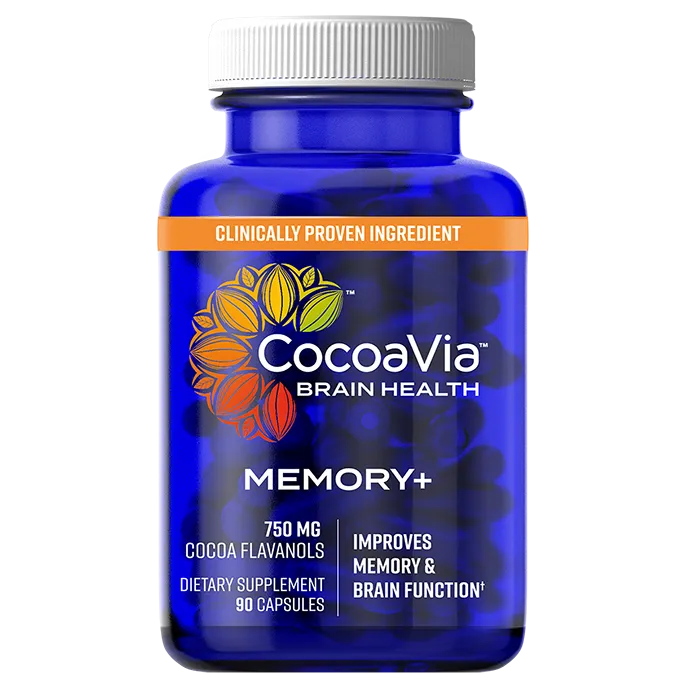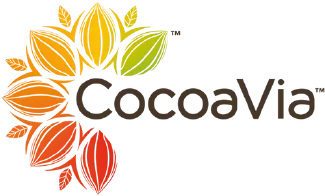
Word Recall Study
The American Journal of Clinical Nutrition, Volume 101, Issue 3, March 2015, Pages 538–548. Published: 17 December 2014
Key Takeaways
• A study was done to see if taking 750 mg of cocoa flavanols could boost memory and brain performance in healthy older adults.
• Healthy adults consumed 750 mg cocoa flavanols every day for 8 weeks.
• Participants were given memory tests before and after the study to see how their results compared.
• Consuming 750 mg of cocoa flavanols daily significantly improved memory and word recall in older adults.
• Regular flavanol consumption can keep your brain strong and your memory performing like it used to.
The Results
31% Word-Recall Improvement
Participants were able to remember 8 more words per minute than before

21% Faster at Brain Tests
Were able to complete a brain test an average of 17 seconds faster than before
CocoaVia™ Memory+ has the same dosage of 750 mg of Cocoa Flavanols as the study

CocoaVia™ Memory+ Supplement
- Each serving delivers 750 mg of cocoa flavanols, the plant-based nutrient proven to boost memory when consumed daily at high levels
- Backed by our 100% satisfaction guarantee, 4 clinical studies, and over 10 years of scientific research
- Take once daily to experience the maximum memory benefits of Memory+.
WORD RECALL STUDY
Study Abstract
Cocoa flavanol consumption improves cognitive function, blood pressure control, and metabolic profile in elderly subjects: the Cocoa, Cognition, and Aging (CoCoA) Study—a randomized controlled trial
The American Journal of Clinical Nutrition, Volume 101, Issue 3, March 2015, Pages 538–548.
Published: 17 December 2014
Background:Recent evidence has indicated that flavanol consumption may have many health benefits in humans, including improved cognitive activities.
Objective:The aim was to evaluate the effect of flavanol consumption on cognitive performance in cognitively intact elderly subjects.
Design:This was a double-blind, controlled, parallel-arm study conducted in 90 elderly individuals without clinical evidence of cognitive dysfunction who were randomly assigned to consume daily for 8 wk a drink containing 993 mg [high flavanol (HF)], 520 mg [intermediate flavanol (IF)], or 48 mg [low flavanol (LF)] cocoa flavanols (CFs). Cognitive function was assessed at baseline and after 8 wk by using the Mini-Mental State Examination (MMSE), the Trail Making Test (TMT) A and B, and the Verbal Fluency Test (VFT).
Results:The changes in MMSE score in response to the 3 different treatments were not different. In contrast, there was a positive impact of the intervention on specific aspects of cognitive function. Mean changes (±SEs) in the time required to complete the TMT A and B after consumption of the HF (−8.6 ± 0.4 and −16.5 ± 0.8 s, respectively) and IF (−6.7 ± 0.5 and −14.2 ± 0.5 s, respectively) drinks significantly (P< 0.0001) differed from that after consumption of the LF drinks (−0.8 ± 1.6 and −1.1 ± 0.7 s, respectively). Similarly, VFT scores significantly improved among all treatment groups, but the magnitude of improvement in the VFT score was significantly (P < 0.0001) greater in the HF group (7.7 ± 1.1 words/60 s) than in the IF (3.6 ± 1.2 words/60 s) and LF (1.3 ± 0.5 words/60 s) groups. Significantly different improvements in insulin resistance (P < 0.0001), blood pressure (P < 0.0001), and lipid peroxidation (P = 0.001) were also observed for the HF and IF groups in comparison with the LF group. Changes in insulin resistance explained ∼17% of changes in composite z score (partial r2 = 0.1703, P < 0.0001).
Conclusions:This dietary intervention study provides evidence that regular CF consumption can reduce some measures of age-related cognitive dysfunction, possibly through an improvement in insulin sensitivity. These data suggest that the habitual intake of flavanols can support healthy cognitive function with age. This trial was registered at www.controlled-trials.comas ISRCTN68970511.

